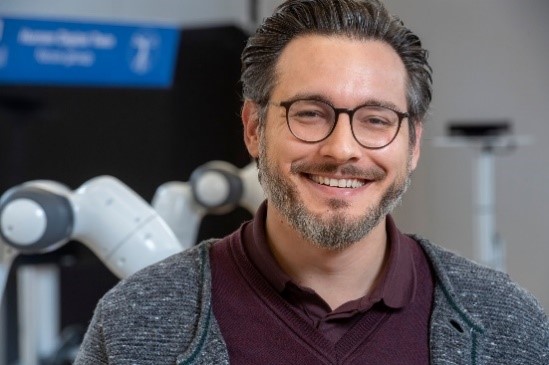Speaker
Description
Smart robotic systems have taken giant leaps in recent years. Important technological breakthroughs have led to the introduction of intelligent machines that meet human needs not only in factories but also in healthcare and in the service industry. Moreover, with the help of artificial intelligence, robots are now capable of learning and continuously developing new skills. Robots, connected to a remote memory that stores large volumes of trained datasets, have become more affordable and user friendly. Even more importantly, cloud-networked robots are now also able to share data, skills and knowledge with each other, creating a ripple effect or even an entire system of ‘collective learning’. A specific skill learned by one individual robot will be instantly available to all other robots in the network. I will talk about my vision for a theory of collective intelligence and applying the knowledge pyramid towards my continuous efforts to strengthen the relationship between robots and humans, with the aim of bringing ever safer, more intuitive and reliable robotics into the real world.
Bio

Sami Haddadin is the Founding Director of the Munich School of Robotics and Machine Intelligence (MSRM) at Technical University of Munich (TUM) and holds the Chair of Robotics Science and Systems Intelligence. He received his PhD from RWTH Aachen in 2011. From 2014 to 2018, he was Full Professor and Director of the Institute of Automatic Control at Gottfried Wilhelm Leibniz Universität Hannover, Germany. Prior to that, he held various positions as a research associate at the German Aerospace Center (DLR). His research interests include intelligent robot design, robot learning, collective intelligence, human-robot Interaction, nonlinear control, real-time planning, optimal control, human neuromechanics and robot safety. His work has found its way into numerous commercial robotics and AI products. Prof. Sami Haddadin has written more than 200 scientific articles and received numerous prestigious international scientific awards, including the George Giralt PhD Award, the IEEE/RAS Early Career Award, the RSS Early Career Spotlight, the Alfried Krupp Award, the German Future Prize of the German President and the Gottfried Wilhelm Leibniz Award.
www.msrm.tum.de/en/rsi/chair-of-robotics-and-systems-intelligence

